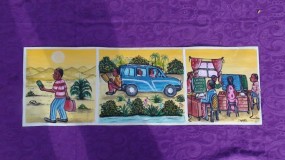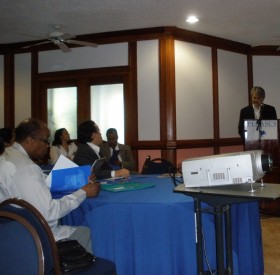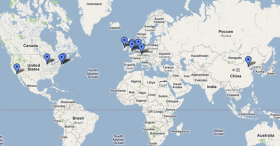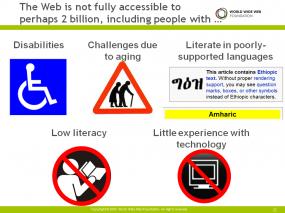The International Development Research Centre (IDRC) is currently convening a very interesting workshop entitled, “Toward A Caribbean Open Institute: Data, Communications, and Impact”, being held in Kingston, Jamaica from 20 June – 1 July 2010. I was invited to give a talk entitled, “Open Government Data”. About 40 experienced and energetic policy and technical experts from regional and international organizations (including the UN), non-governmental organizations, universities, and the finance and communications sectors are actively engaged in discussion. A key aim is to explore how open institutional data approaches, Web 2.0 communications, and monitoring and evaluation methods can become forces that increase regional collaboration on issues such as agriculture, fishing, trade, tourism, immigration, ICTs, entrepreneurship, etc.
Archive for By Steve Bratt
Internet, Media, Responsibility in a Commencement Speech
I had the great pleasure of watching my daughter graduate from Dickinson College a few weeks ago (I could say much more about the emotional and financial aspects of this milestone). The commencement speaker was Jon Meacham, editor of Newsweek magazine and Pulitzer Prize-winning author — one of the most insightful, humorous and articulate speakers I’ve ever had the pleasure of listening to. Just one section of his speech gave me pause:
“Technology … has created the means by which voices, often anonymous, can be heard saying things they would not be brave enough to say with their lips. With power comes responsibility. But too often the Internet has divorced the two. Now anyone can say anything with impunity. … May your generation be the one to stand up to reflexive extremism and on-line hyperbole … and say enough — this will not stand”.
Web-Empowered Education, Agriculture and More: World Economic Forum on Africa

The Web has the potential to increase access to educational materials in Africa, and make it easier for people in Africa to contribute new materials to the world.
This is a belated post on the World Economic Forum on Africa, held last month in Dar es Salaam, Tanzania. First, this event has been in Cape Town, South Africa in past years, and it is critical that WEF moved it closer to the locus of matters of greatest importance to the continent. Second, the gathering of leaders and practitioners from government, industry, and philanthropy provided the perfect mix for gaining feedback on the programs and plans of the World Wide Web Foundation.
I was invited to talk in the session, Higher Education in Africa, with a focus on the use of the Web to empower educators and students to access content from around the world, and, ultimately, to contribute educational materials for the benefit of the rest of the world. The format of my talk, Web-Empowered Education in Africa — Read more
Web Sci 2010: Current and Future Web Scientists and New Lab Network
Raleigh, North Carolina was a busy place two weeks ago. At the same time as the Web for All Conference, and just upstairs in the convention center, the second Web Science Conference took place. The agenda for WebSci10, as it was tagged (Tim Berners-Lee commented that this tag implied the event had been around for more years that it has been) framed the diversity and dynamism of this new field of study. Tim and Wendy Hall announced the creation of a network of Web Science laboratories — WSTNet. I took the opportunity of the proximity of the two conferences to hear some Web Science talks, review interesting posters, and have valuable discussions with Web scientists.
Web for All; Conference Keynote
Today and tomorrow, in Raleigh, North Carolina, USA, the 7th International Cross-Disciplinary Conference on Web Accessibility is taking place. Most call this event Web for All or W4A. The focus this year is “Developing Regions: Common Goals, Common Problems?”, which is perfect fit for the Web Foundation’s initial focus. I had the honor of delivering the opening keynote, entitled, “Breaking Barriers to a Read/Write Web that Empowers All” (PDF, PPT).
Impressions of Burkina Faso, Through Pictures and Video
 Though most of photos and videos from Burkina Faso in this post are strongly related to our Web Alliance for Regreening in Africa project, I want to share these reflections on this country, its people and its potential.
Though most of photos and videos from Burkina Faso in this post are strongly related to our Web Alliance for Regreening in Africa project, I want to share these reflections on this country, its people and its potential.
The work to the right is by the artist, Kabré, who does custom painting outside of our hotel in Ouagadougou. I asked him to illustrate the use of mobile phones, laptops and computers in his country. I also asked that the panel on the left be a farmer talking on his mobile phone. My French must be even worse than I thought, because he painted a tourist. This cool work is now hanging in Boston office.
Web Foundation, Tim, Steve Featured on CNN Segment
CNN producer Jason Sanchez interviewed Tim Berners-Lee and me for a segment on their show called “Conscious Capitalism”. Have a look…
Video: Tim Berners-Lee on Separation, Standardization, Openness, Neutrality Across the Net
Tim Berners-Lee gave a talk (see video above) in the Brussels, Belgium on 16 March to people from the European Union, industry and press. He conveyed the motivation for the creation of the Web, for open Web standards, and for the creation of the Web Science Trust and the World Wide Web Foundation.
Web Science Conference 2010: Don't Miss It
http://www.websci10.org/registration.html
for WebSci2010! This exciting conference is during the WWW2010 week in Raleigh, North Carolina, USA. The organizers seek papers that demonstrate the development, scope, and relevance of the emerging field of Web Science, which is taking off around the globe. Web Science Conference 2010 is the 2nd such event, following a successful inaugural event in Athens, Greece last year.
New Institute for Web Science to Explore Next Generation of the Web
United Kingdom Prime Minister Gordon Brown announced sweeping plans to make the UK the world leader in the digital economy by 2020, the BBC reports. An key component of the Prime Minister’s plan is a commitment of 30 million GBP to create a new Institute of Web Science. The Institute will be headed by Nigel Shadbolt and Tim Berners-Lee, who also serve as Directors of the Web Foundation. The Institute will carry out pioneering research, in collaboration with universities and the private sector, to develop the next generation of Web technologies.
An official press release from the UK’s News Distribution Service regarding creation of the Institute of Web Science is now available.
More details on the Institute of Web Science, and how the Web Foundation will be cooperating with this new partner will be forthcoming. Congratulation to all involved!



